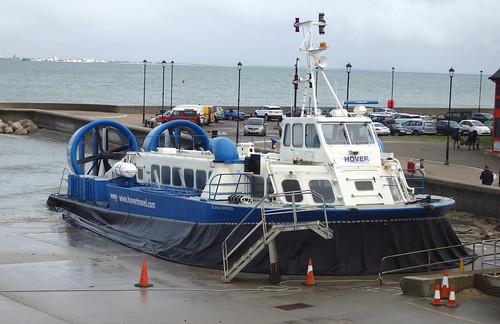For the recent voiceover work I've been doing on my layout build videos, my pin mic (it's what I had, don't judge me) has been clipped to a ruler propped up in a mug. That ruler is a HoverTravel souvenir.
According to the web, Island Express is a AP1-88 hovercraft - there's some info on Wikipedia. More by luck than judgement, I must have travelled and photographed it in its last year in service. As I recall, the ride was typical hovercraft, noisy and a little bumpy, but good fun.
Much as I'd like a model, radio control hovercraft are all technical and no fun to build as far as I can tell. You spend all your time worrying about keeping the weight down and making things work. Even if your model does work, sailing (flying?) it is somewhat challenging. I'll stick to spectating.

6 comments:
A "pin" or "lav" mic actually sounds about right - although I'd probably be inclined to clip it to the front of a sweatshirt, or similar.
Certainly, I'd be inclined to have it effectively resting against the chest area - to improve the bass - as I suspect that a number of mics of this sort might well have the bass filtered back a bit.
You might want to watch for some other stuff with any future speech recording, if you try using a cardioid - especially a "dynamic" one.
A lot of the cheap "ball on a stick" style dynamic ones sold for karaoke (ab)use have a raised response in the "few kHz" range - perfect for emphasizing breath pop and sibilants (the hissing that often accompanies the letter "s").
Not trying to "eat" the mic is reputed to help here (especially a bit below the mouth, as the palate deflects breath forward and sound down).
OK - hands up anyone who might be tempted to hold the thing against the chest (or even bodge a cardioid electret element into a homebrew "tieclip"), in an effort to make the voice sound more "bassy" than it really is ... . (Errrm ... yes ... I'd been intending to take that mirror down.)
Joking aside, I acquired a scrap PZM housing some years back - and I've been intending to experiment with a small, cheap, "omni" element ever since. Who knows - one of these days, I might even get round to doing this ... .
I thought that the Hovercraft service to the Isle of Wight was still operating. A group of us used it last year to go to the steam railway.
Dave
Hi Phil,
I once built a hovercraft using a polystyrene ceiling tile as a base. The skirt was a heavy duty black bin liner cut thus:
Using a double thickness; mark out a profile about 30mm larger than the hull and go round with a soldering iron to seal the layers together; cut a hole the same profile as the "hull" but about 10mm smaller all round; then cut round outside the seal (sort of like a 2-ply toilet seat cover). Stick to the hull with double sided tape. Easy to make and easily replaced when torn!
2 props port and starbord gave propulsion and steering and centrifugal blower on centre provided lift. (Mounted with the shaft fore and aft to avoid torque reaction.)
It flew well on the kitchen lino and garden path but I never had the courage to take it out on water. Control was by a thin 4-wire tether from a battery box but I daresay with modern high power motors you could fit an on board battery and r/c system and still get decent lift.
Keep up the good work,
Nick
Dave - the service is still operating, although this craft has retired now.
Maybe your next project? This sailed in inland waters in British Columbia, Canada. A Canadian National Railways' tug boat. Marine and rail interests combined!
Steve Lucas
https://www.facebook.com/photo.php?fbid=2302527623388546&set=gm.10157161509277821&type=3&theater
Steve - That is an interesting looking boat. I can just imagine building it to haul a barge with trains on the back.
I wonder why the bridge is so tall? Surely that would affect stability? Hmmmm
Post a Comment